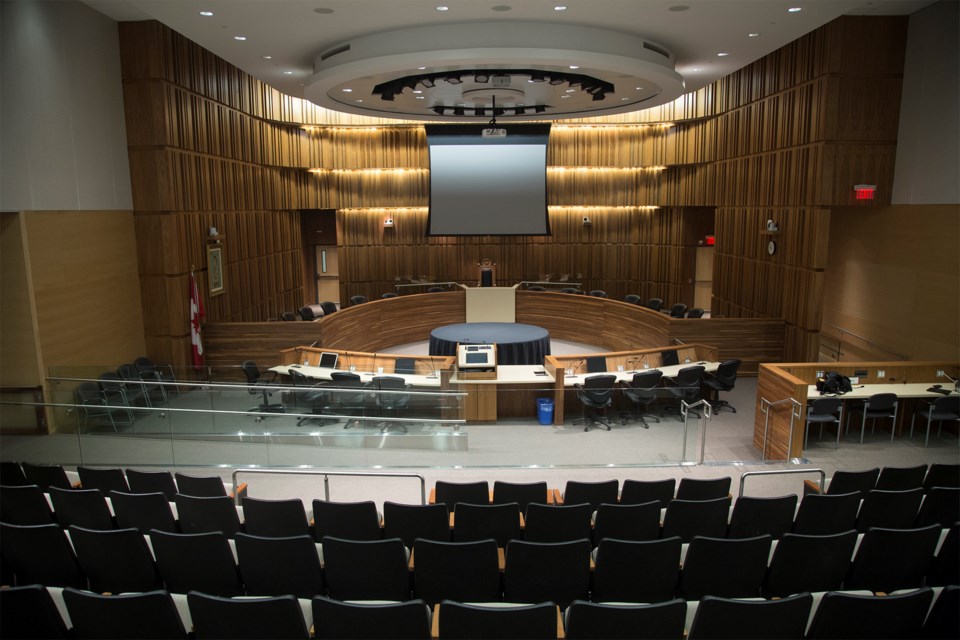Someone once said the democracy is the worst form of government except for all the others. In terms of governance, it’s like a Nickelodeon game show for kids, you might be going along thinking that you’re doing fine, and out of nowhere a bucket of slime gets dumped on your head.
The slime is inevitable. The slime is the point. But I worry at times that our city council is trying so hard not to get slimed that they forget that there’s a game that must be played.
At Monday’s Committee of the Whole, this thought occurred to me again after a presentation of Our Energy Guelph when councillor Rodrigo Goller proposed a motion that came out of said report.
“Our procedural bylaw states that presentations are to be for information only,” said Mayor Cam Guthrie. “It’s kind of a grey area, but I think that the way this [motion] should have come forward is through the chair, with the agreement of a Deputy CAO, and it’s actually put on the Committee of the Whole as an actual report.”
The sounds reasonable, plus Guthrie prefaced this by saying that he supported the motion and added that if had been the chair, than he would have found the motion in order too. Still, motions like this are apparently a little too jazz for a council that just wants to hear the classics.
“I just want to flag this for council as an opportunity at the end of the year, when we have our midterm procedural bylaw update, to talk about not using the presentation process over and over again to allow motions and directions of council to move things through the agenda,” Guthrie added.
Councillor Dan Gibson, who was at the time acting as the chair of the Infrastructure, Development and Enterprise committee, agreed.
“You took the words right out of my mouth,” he said. “This isn’t a traditional way to bring forward a motion. In a perfect scenario I would have been consulted, and I would have referred this to staff and have them come back.”
While I appreciate the gentlemen’s desire for a well-organized system, a motion at the end of the presentation should not have been some as a terrible surprise, because Our Energy Guelph asked for a motion at the end of their published presentation. It wasn’t precisely worded, but Goller captured its gist in the motion he ended up bringing forward.
Ultimately, the whole thing was dispatched in about 23 minutes of debate, which is fine because the “too long; didn’t read” of the motion was to send staff back to get information on how to deliver Our Energy’s proposal for a program to grant homeowners loans for energy efficiency upgrades. Council wasn’t signing an oversized novelty cheque or anything, and it was information they’d eventually have to ask for anyway, otherwise why is Our Energy Guelph doing the work.
But moving on from this specific case, it does concern me that it seems like at Guelph City Council there’s only one way to put things on council’s radar, and that’s through the one proper procedure. I’m by no means a governance expert, but it seems odd to suggest that every thought a councillor could have should be written out in advance, or that there’s no room for spontaneity in the course of a meeting.
And this has been a trend for a while. Moving to Committee of the Whole was originally billed as an effort to rein in the length of council meetings and get more focus to help council get to decisions quicker. It’s a laudably goal, but I think we can also argue that the length of council meetings would just as easily be impacted with 13 fewer stump speeches per topic.
It is frequently observed that democracy is messy, but our city council’s obsession has been to make it as clean as humanly possible: all questions must be answered in advanced of the meeting, all relevant information must be at hand and properly notarized, and all motions must be submitted in writing.
At the same time, we lionize the need to make all important decisions unanimous, and we consider more split decisions to be a symbolic of a broken system. The reality is that split decisions are often a measurement of the difficulty in reaching them, and we shouldn’t lose sight of the fact that getting 13 people to agree on anything is always something of a minor miracle no matter the circumstance.
It’s also a minor miracle when the average person is able to work up the desire to engage with their local government, and now they not only hit a wall of procedure in terms of how city council is structured, but the fact that there are some on council who seem invested in building more walls that say you can only get around them when the time is right.
Democracy is messy, and maybe city council needs to be more okay with that.
